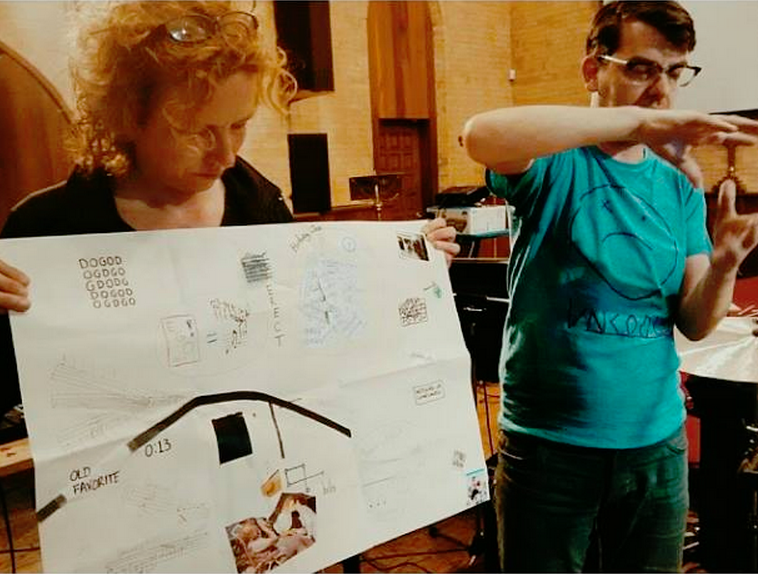
Actually, it never really left, but The Groove was in the limelight during this concert of Dutch and Canadian contemporary music at the Music Gallery Friday night, April 4th. A joint effort by The Array Ensemble, Continuum Music and a number of guest musicians including the Dutch group Trio 7090, the concert was part of a multi-event showcase entitled Gaudeamus: Deconstructed/Reconstructed, which showcased two concerts of music and roundtable discussions on contemporary music in the Netherlands and Canada. This second concert in the showcase presented musical works by winners of the Gaudeamus prize: Louis Andriessen, Yannis Kyriakides and Michael Oesterle, and by Gaudeamus Muziekweek participant eldritch Priest.
It is most natural (and perhaps necessary) to begin a concert of Dutch contemporary music with a piece by Louis Andriessen, who initially rocked the foundations of the conservative post-war classical music scene in the Netherlands. His music- almost anti-Classical with its incessant rhythmic repetition, loud dynamics and penchant for saxophone, amplified singing and rock instrumentation, is considered the patriarchal source of most Dutch contemporary music today.
The concert opened with Hout for electric guitar, tenor saxophone, piano and marimba (1994). Like most of Andriessen’s music, Hout consists of loud, intense barrages of repeated cells of material arranged in close unison canons. The music, with its almost tongue-in-cheek straightforwardness, was performed with precision by Ryan Scott, Rob MacDonald, Laurent Phillipe and Michiel van Dijk, who maintained the ferocious, uneven streams of music material throughout.
Second on the programme was the world premiere of Michael Oesterle’s portrait piece, Babbitt, dedicated to composer Milton Babbitt, whom Oesterle studied with at Princeton University. Surprisingly, the music eschewed any attempt to mimic the high modernism of Babbitt’s own music, and instead seemed to embrace the illuminating presence and humour of Babbitt’s own personality. The music leapt and sparkled and occasionally swaggered its way through the piece’s opening, as if almost constantly on the edge of breaking into a quirky Broadway-like swing. Disappointingly, the piece’s brilliant opening betrayed the second half of the piece, as the music retreated into a more introspective though less musically interesting conclusion.
After an intermission was eldritch Priest’s piece for bass, violin, flute bass clarinet, vibraphone and electronics, titled glossolalia (stress positions) (2008). The music, as the composer writes in the programme notes, suffers from “…expressive aprosodia- an impaired ability to produce or convey emotional or affective cues.” The piece opened with rhapsodic snatches of a xenharmonic reed organ (electronically recorded), which was joined by a muted, though equally rhapsodic violin. The rest of the piece, plodding through in homophonic chunks by the whole ensemble with a ceremonial austerity, maintained its puzzling character with almost frustrating consistency.
The final piece on the programme was Cyprus-born Dutch composer Yannis Kyriakides’ 1999 piece, tinkling or killing time in an airport lounge (and being arrested), for cello, double bass, electric guitar, violin, flute, clarinet, trombone, solo piano and 2 percussion. The piece, based around a zany Thelonius Monk riff first introduced in the piano by Nora Mulder, whirled into a furious dervish of wailing brass and strings, stuttering drum beats and endless flutters of piccolo, clarinet and xylophone. The music seemed to disorient itself with its consistent spinning, as music lines heaved, stuttered and distorted while the ensemble maintained its breakneck energy and precision. The piece, with its instrumental virtuosity and skilled compositional variation of intense perpetuum mobile, represented the highlight of the evening.
Tyler Versluis
+++
Tyler Versluis is a Toronto-based composer, pianist, and organist who has recently completed graduate studies at the University of Toronto. Recently, Tyler was guest composer for Toronto’s Toy Piano Composers and composer-in-residence for gamUT new music ensemble. As a pianist, he performs regularly with gamUT and freelances as an organist in the Toronto and Niagara region.
- OPEN LETTER | Christina Petrowska Quilico Remembers Pierre Boulez - January 7, 2016
- Op-ed: The Compositional Voice and the Need to Please - September 4, 2014
- Onomatopoeia: The Thin Edge New Music Collective Sounds Off - May 10, 2014



